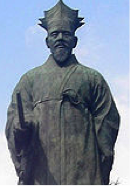 The 16th century poet, philosopher, civil servant and educator Yi Hwang is known as one of the Joseon Dynasty’s most notable Confucian scholars from Korea. Besides a considerable output of written work he was responsible for the establishment of a private academy known as both Dosan Seowon and also the Yeongnam School. His work was published under his own name and at least two pen names – T’oegye, which means Retreating Creek, and Gyeongho, referring to the province of his birth.
The 16th century poet, philosopher, civil servant and educator Yi Hwang is known as one of the Joseon Dynasty’s most notable Confucian scholars from Korea. Besides a considerable output of written work he was responsible for the establishment of a private academy known as both Dosan Seowon and also the Yeongnam School. His work was published under his own name and at least two pen names – T’oegye, which means Retreating Creek, and Gyeongho, referring to the province of his birth.
He was born some time during the year 1501 in Ongye-ri, which lies around 200 kilometres south west of Seoul, in the North of the Gyeongsang Province. His family were fairly minor aristocrats Yi was the last born of seven siblings. He was clearly a bright boy and by the age of twelve he had learned the

with the help of an uncle. His early interest in poetry was inspired by reading the work of Tao Qian, possibly the greatest writer of the Six Dynasties period which covered the years 220-589 CE. Yi continued to study the masters and write his own poetry all the way through his teenage years.
He seemed to have an insatiable thirst for education, entering Sungkyunkwan in the year 1523. Within four years he had passed the preliminary examinations which would lead to his working as an official in the government, achieving this goal in 1534 having passed all of his exams with honours. He held a number of appointments, specialising in rooting out corrupt colleagues. His status gave him access to the court of the royals but eventually he became disillusioned by the antics of some of those whose aims were to manoeuvre their way to the top by any means possible. He tried to leave government service many times, constantly being persuaded to come out of retirement and take up one post or another, including governorships.
He was also tempted to return to royal court duties but, at least initially, turned down all the opportunities offered. He was more interested in educational establishments though and involved himself in a number of academies, teaching and inspiring his students. He was, however, coerced into returning by the king and, at 68, found himself once more at court. He wrote educational papers including one called

and gave lectures before retiring from public office for the last time in his late sixties.
Yi was both a talented poet and calligrapher and one of his collections of poetry consisted of work in the sijo style, this taking the form of three line verses that were especially popular with literature lovers of the Joseon period. An example, believed to have been written in 1565, was Fragrant Orchids In The Valley and it is reproduced here:

A slightly longer piece was Even a foolish fellow can know and act, a philosophical observation by the writer of the effects of the march of time on both fool and sage. The message here seems to be that it does not really matter which you are – age catches up on us all. Here is the poem:

Yi Hwang died sometime during the year 1570 which would have made him 69 years old.

